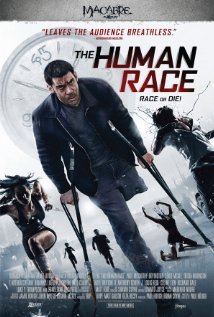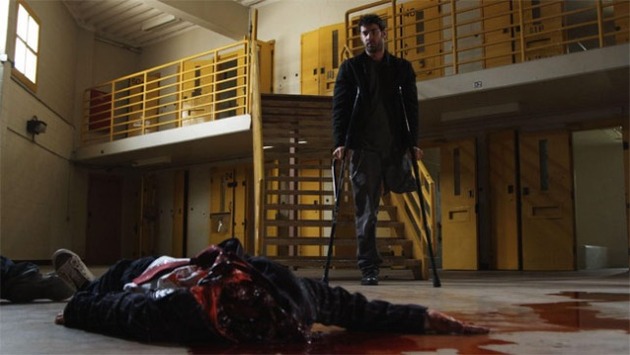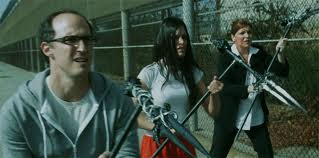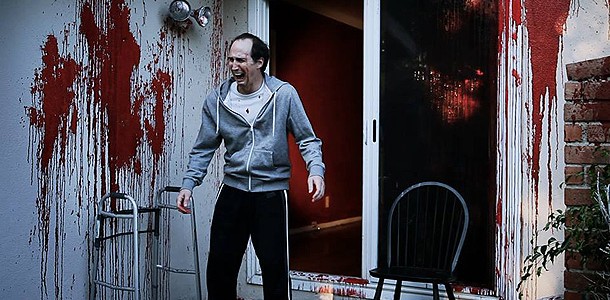 The “deadly game” idea is basically a “gimme” as far as concepts go for genre films. You stick a bunch of diverse characters into an unfamiliar locale, either force them to start picking each other off (the 10TH VICTIM/HUNGER GAMES variant) or have them hunted down by a non-player (the MOST DANGEROUS GAME/RUNNING MAN variant) and all you’ve got to worry about are the mechanics, defining the characters, setting up interesting situations, coming up with clever twists – okay, so you’ve still got plenty to worry about. At least the framework is done, and the movie is easy to explain.
The “deadly game” idea is basically a “gimme” as far as concepts go for genre films. You stick a bunch of diverse characters into an unfamiliar locale, either force them to start picking each other off (the 10TH VICTIM/HUNGER GAMES variant) or have them hunted down by a non-player (the MOST DANGEROUS GAME/RUNNING MAN variant) and all you’ve got to worry about are the mechanics, defining the characters, setting up interesting situations, coming up with clever twists – okay, so you’ve still got plenty to worry about. At least the framework is done, and the movie is easy to explain.
And THE HUMAN RACE, the new film from writer/director Paul Hough (who had previously helmed the underrated underground wrestling doc THE BACKYARD and recently contributed a chapter to the great “Hidden Horror” anthology book), has a premise that’s easy to explain. A bunch of diverse characters are suddenly transported from their urban dwelling to a remote location where a voice tells them they must walk, and if they are lapped twice or step off of the path, they will die. You really can’t get a simpler premise than that – it’s a mixture of Stephen King’s “The Long Walk,” THEY SHOOT HORSES, DON’T THEY and SERIES 7, with a touch of SAW thrown in for style.
The execution of a simple premise like this is what separates the BATTLE ROYALEs from the HOUSE OF 9s. Fortunately, Hough has plenty of ideas in play and a willing cast to let those ideas run wild, starting with the impressive slight of hand that opens the film and prepares you for the idea that anything may happen.
Most notably is that the central characters aren’t horror movie archetypes, but unique human beings with just enough personality to be memorable without having their backstories awkwardly shoehorned into the running time. First season “Big Brother” winner (and real-life amputee) Eddie McGee plays Eddie, a veteran who lost his left leg during his service. Trista Robinson and T. Arthur Cottam play a deaf couple whose viewpoints are a yin and yang of optimism and pessimism about the world in general. Paul McCarthy-Boyington plays Eddie’s best friend, a fellow vet who now works as a teacher. The random assortment of folks also includes a pregnant woman, a young Asian sibling pair dressed for private school in a wink to BATTLE ROYALE, an elderly war veteran, and an assorted bunch of characters that, while never firmly established, are easy to tell apart.
This is no small feat, as THE HUMAN RACE sets up the titular battle to include 80 (!) combatants, with their decreasing number trumpeted through a voice in the same way tributes’ faces are displayed in the “Hunger Games” series. This disembodied voice, which also takes on the voice of whoever is hearing it, also explains the rules of the game, including the fact that the house, the jail, and the school, all structures on the track, are “safe.”
 “Safe” is certainly a relative term. While the competitors find that they can move around a few buildings, unlike being outside where a step off of the concrete path onto the grass causes their heads to explode in a fury of CGI blood, they soon find themselves at odds with each other, especially as one racer is determined to lap everyone else in order to “win.”
“Safe” is certainly a relative term. While the competitors find that they can move around a few buildings, unlike being outside where a step off of the concrete path onto the grass causes their heads to explode in a fury of CGI blood, they soon find themselves at odds with each other, especially as one racer is determined to lap everyone else in order to “win.”
But what’s the prize? How did they get there? What’s the significance of them taking their phones and IDs, but not other items in their possession? Why are the school, house and jail safe? Why were these people chosen?

Some of these questions are answered, but for the most part, they’re just left to flap in the wind. It’s not that THE HUMAN RACE needs to answer these questions, but it needs to be convince the audience that the filmmakers have at least fully considered the world they’ve created. Sadly, it never quite comes across that they have, especially with an ending that feels more like inevitable desperation rather than a clever resolution that’s been hinted at throughout the running time.
It’s a shame, too, as there’s enough cleverness in place in the film to make the disappointment of seeing the closing credits and realizing how little closure you get all the more palpable. Hough lines the film with plenty of impressively shocking moments, pairing them nicely with scenes that are genuinely suspenseful and often subverting the expectation for the standard protocol for a movie of this nature. In fact, it’s almost over-ambitious, with split screens, a distinctive bright white look that works well with the isolated surroundings, and enough interesting ideas to fill a half-season of “Lost.”
The problem is that enough of those ideas don’t pan out to anything (much like a half-season of “Lost”), and THE HUMAN RACE doesn’t have a tone strong enough to overcome these deficiencies. Unlike similar films that have used the premise for satire (SERIES 7), social commentary (BATTLE ROYALE) or to create a fully-formed dystopian world (HUNGER GAMES, ESCAPE 2000), THE HUMAN RACE doesn’t seem to have a deeper motive and settles on just being relentlessly bleak, a trait that becomes obvious with the inclusion of little kids and pregnant women. If the film had been done with more gallows humor or had a last act reveal that utilized the film’s more unique concepts as pieces of a larger puzzle rather than just allowed them to confuse, THE HUMAN RACE could have been a genuinely great exploitation film.
There’s still enough on display to make THE HUMAN RACE worth a look, especially for “deadliest game” aficionados. McGee makes for a charismatic lead, Hough certainly has a fine eye, and there’s enough invention on display to make me curious as to what he’ll do next. THE HUMAN RACE is good enough to be frustrating when it falters, placing it somewhere near the middle of the genre, even if it’s so alternately well-made and ill-conceived that “mediocre” doesn’t quite describe it.
THE HUMAN RACE opens in select theaters and on VOD this Friday, June 13th.
@Paul Freitag-Fey
- [THE BIG QUESTION] WHAT’S YOUR FAVORITE FEMALE ENSEMBLE IN MOVIES? - July 22, 2016
- [IN THEATERS NOW] THE BOY (2016) - January 24, 2016
- Cult Movie Mania Releases Lucio Fulci Limited Edition VHS Sets - January 5, 2016






No Comments